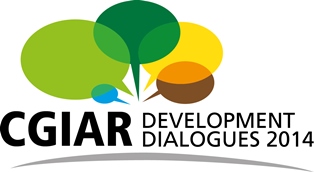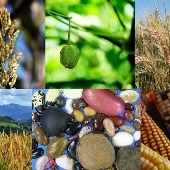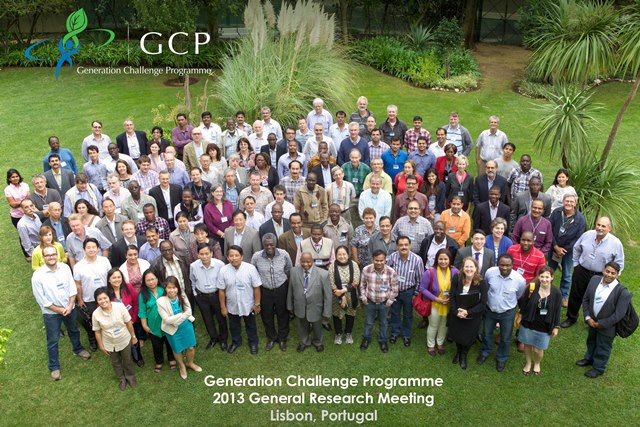Talking Science and Living Data: CGIAR engaging cyberspace in Development Dialogues 2014
- Published Date
 CGIAR is shining the global spotlight on agricultural research with its pioneer event Development Dialogues 2014, where conversations will converge on the vital role of agriculture, livestock, forestry, fisheries, landscapes, and food systems in achieving sustainable development. The event is scheduled for 25th September 2014, at Columbia University, New York, USA.
CGIAR is shining the global spotlight on agricultural research with its pioneer event Development Dialogues 2014, where conversations will converge on the vital role of agriculture, livestock, forestry, fisheries, landscapes, and food systems in achieving sustainable development. The event is scheduled for 25th September 2014, at Columbia University, New York, USA.
To break the ice and get the conversations going, CGIAR has launched a couple of exciting online competitive interactions.
The first, called Talking Science, encourages CGIAR researchers and partners to share the specifics of their research projects, and to showcase their direct relevance to the UN Sustainable Development Goals.
The deadline for submitting blogpost entries has been extended by another month to 15th October 2014, and we invite all GCP researchers to dust off that digital quill and parchment, shake your inner muse, and use words of inspiration to inspire others about the very work you do!
Those entering the competition will be able to get just a little help from your friends, the CGIAR communications staff, for editorial assistance.
Blogposts will be published on the Development Dialogues website.
Further particulars including submission details, selection criteria and prizes can be found here.
Love data? Then make sure it’s alive and kicking!
The second online interaction, called Living Data, encourages the general public to repackage CGIAR research facts, figures and open source data in new and exciting online ways (such as with infographics, photo films, animated graphics, among others). The deadline for submissions has likewise been extended by a month to 15th October 2014. Check out all the rules, regulations and nitty-gritties here.
Winners will be announced on 25th October 2014.
Good luck to all budding bloggers and data designers!
Venue: 2014 General Research Meeting
- Published Date
 This year’s General Research Meeting (GRM) will be held in Rayong, Thailand (about a 2-hour drive from Bangkok).
This year’s General Research Meeting (GRM) will be held in Rayong, Thailand (about a 2-hour drive from Bangkok).
Initially, the GRM was to be in Senegal, West Africa. Unfortunately, due to growing concern on the Ebola epidemic in the region, we have regretfully had to change the venue.
We apologise for the inconvenience this late confirmation of the venue may cause.
Dates remain unchanged, ie, 7th–10th October 2014.
More details on the GRM will be posted to this page.
GCP Director’s opinion piece published in SciDev.Net
- Published Date
Partnerships in research for development
 |
| Jean-Marcel Ribaut |
Published on SciDev.Net on 9th July 2014, the piece is entitled How to build research partnerships that benefit farmers. It begins by describing the nature of agricultural R4D, and possible problems and pitfalls, such as fragmented activities or poor communication resulting from research being stretched the length and breadth of the research river, where ‘upstream’ and ‘downstream’ research do not traditionally (or necessarily) mix.
Enter the CGIAR Generation Challenge Programme, a clear example of an initiative that has forged effective research partnerships throughout its 10-year lifetime. Jean-Marcel sketches GCP’s two phases which kept partnerships at the forefront: Phase I’s predominantly ‘competitive’ nature where ‘integrative partnerships’ were a necessary feature of the open calls; and Phase II’s commissioned research which similarly encouraged strong partnerships, taking no ‘alibi’ partnerships in the process. He also recognises failures along the way – providing valuable lessons learnt.
Jean-Marcel describes the ‘model pupil’ that is GCP, a Programme that excels in more subjects than genetics, genomics and informatics. It turns out that GCP is also adept at:
- chemistry – successfully combining elements to produce effective and enduring partnerships over the years
- geology – having found the precious gem described by Jean-Marcel as “an intangible spirit and culture based on mutual trust, respect and a genuine desire to complement the work – and to tap the skills – of other partners”
- gastronomy – blending gourmet ingredients such as a constant desire to help and passing leadership on to the next player in the delivery chain to build promising projects into focused commissioned work.
Jean-Marcel ends with a cautionary note about the GCP model, and offers advice on how to strike the right management balance to nurture a network spirit. Access the full article
| Below: Nurturing a network sprirt at GCP's 2013 General Research Meeting |
 |
Call for research ideas on wheat, heat and drought
- Published Date
 The CGIAR Research Programme on wheat is calling for proposals. The work will be implemented through the Heat and Drought Wheat Improvement Consortium – HeDWIC, a Consortium to be facilitated by our host, the International Maize and Wheat Improvement Center (CIMMYT). CIMMYT also leads the International Wheat Improvement Network (IWIN).
The CGIAR Research Programme on wheat is calling for proposals. The work will be implemented through the Heat and Drought Wheat Improvement Consortium – HeDWIC, a Consortium to be facilitated by our host, the International Maize and Wheat Improvement Center (CIMMYT). CIMMYT also leads the International Wheat Improvement Network (IWIN).
In order to launch HeDWIC and to frame the discussion around the best ideas worldwide in plant stress technology, research ideas are to be presented at a conference in Frankfurt am Main, Germany (1st–4th December 2014) at which other stakeholders will be present, including funders who have expressed interest in the HeDWIC initiative. Researchers whose proposals are selected for presentation will be sponsored to the conference.
The research framework spans three main components:
- Component 1: Resource capture and utilisation efficiency
- Component 2: Reproductive growth and resource partitioning
- Component 3: Impact targeting, and strategic deployment of traits and alleles
Components 1 and 2 encompass basic research on major stress-adaptive characteristics that are expected to contribute to improved performance under heat and drought stress (based on precedent and theory in published literature). Component 3 represents a series of implementation steps required to harness cutting-edge breeding approaches in regions where the CGIAR Research Programme on wheat operates.
Deadline for applications: 1st September 2014 | ![]() More details, including how to apply (465.15 kB)
More details, including how to apply (465.15 kB)
Change in dates for final General Research Meeting
- Published Date
 Due to multiple calendar conflicts with other events that involve key participants at the GCP General Research Meeting (GRM) 2014, we have most regrettably had to reschedule the GRM, which will now be held on 6th to 10th October 2014, and not on 1st to 6th September, as we had communicated earlier.
Due to multiple calendar conflicts with other events that involve key participants at the GCP General Research Meeting (GRM) 2014, we have most regrettably had to reschedule the GRM, which will now be held on 6th to 10th October 2014, and not on 1st to 6th September, as we had communicated earlier.
While we are still reviewing options on the venue, the purpose of this final GRM is clear-cut and twofold:
- GCP’s closure, on which considerable advances were made in the last GRM in 2013; and,
- the future of GCP’s Integrated Breeding Platform (IBP) in its proposed Phase II. IBP will outlive GCP.
With this futures perspective in mind, one of the planned activities – to which considerable time will be devoted – is defining user needs, and how to best support these needs, in the context of IBP. For this objective, we would be seeking to work hand-in-hand with current and previous GCP scientists as core users and as partners in feedback and advocacy, specifically in developing, deploying, improving and disseminating IBP’s Breeding Management System, version 3 of which is slated for release in August 2014.


